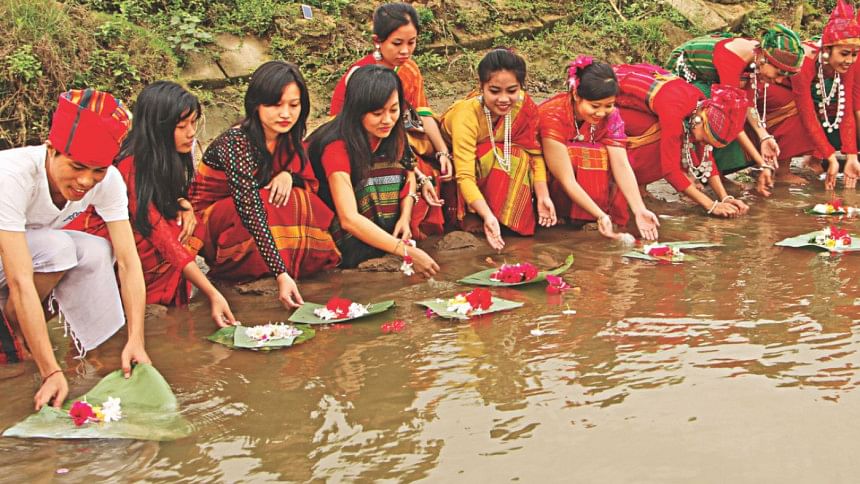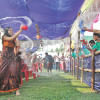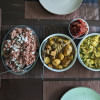Pajon aroma in the hills for Biju

Turu turu tururu baji bajette
Para para berebong bekkun miline
Eichha biju biju biju…
(Turu turu flute is playing,
We will roam together around in the neighbourhood, Today is Biju)
While this popular Chakma song is being played in many houses of the Chittagong Hill Tracts, the women of ethnic communities get busy with the preparations for Pajon on the day before the New Year.
Pajon is a special vegetables dish without which the Chakma and Tripura New Year Biju and Baisuk, respectively, becomes incomplete.
It is also popular among the Marma community who call their New Year Sangrain.
Together the main day of the three celebrations called Boisabi would be observed today in the CHT region.
"Without Pajon, our celebration of biju is not fulfilled," said Parul Dewan, a young Chakma woman who is celebrating Biju in Dhaka, but made sure she had all the ingredients to cook the ethnic cuisine.
"The specialty of Pajon is in its flavour," said Parul.
"That particular flavour cannot be found in other mixed vegetable dishes because Pajon is cooked with some rare vegetables, found only during the Bangla month of Chaitra," she added.
"Tara, a vegetable that grows in the hills and has a special flavour, is a must for Pajon preparation," Parul said.
Local vegetables bedagi, hathol dingyi, bigol biji [chakma names], different types of hill potatoes, sweet potatoes, potatoes, beans fry, dried fishes, bamboo shoots, green jack fruits and its ripen seeds and many other popular vegetables are needed to cook Pajon and different types of spices are added to make it tasty.
Mondakini Chakma, an 85-year-old woman, said, "You have to add at least 22 kinds of vegetables to cook Pajon and the more vegetables you add, the better the Pajon will taste.
"You can also add dried vegetables. Radish, beans and bamboo shoots dried for preservation can also be used."
Snigdha Chakma, aged 51, a school teacher by profession, said, "There is a myth that Pajon is good and helpful for your health and remedial for diseases. If you eat Pajon at least in seven houses on Biju, then you will remain free of illness throughout the year.”
Many young people like Dalim Kumar Tanchangya put eating Pajon on top of the to-do list on Biju. He said he will visit at least 20 homes to taste Pajon today.
Vegetables sellers at kitchen market of Rangamati were busy all day selling their products. Many used ingenious techniques to attract customers.
Subina Chakma, a grocer who trades only during market days on Saturday and Wednesday, went to Rangamati Banupura Bazar with her vegetables on a Tuesday, eyeing good business ahead of Biju.
She was shouting "kiranmala misty alu lau" (come buy some kiranmala sweet potatoes).
Subina said she named her potatoes after the popular Indian TV series character Kiranmala to attract the customers.
Her home in Hugurmara area of Naniarchhar is an hour away and she has to take a CNG-run auto-rickshaw home after selling her goods.
But the grocer was afraid that she would not make enough to cover her transportation cost as she had to sell many of her vegetables, including green jackfruits, at a much low price than expected.
"Tomorrow [April 13] is Biju and people need to cook Pajon," she said. She too needed to go home and prepare Pajon for her family and celebrate Biju.

 For all latest news, follow The Daily Star's Google News channel.
For all latest news, follow The Daily Star's Google News channel. 








Comments